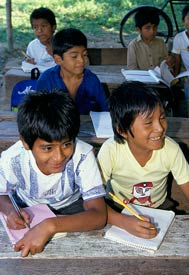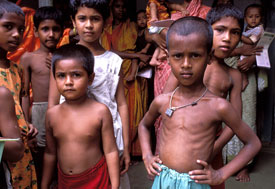Child health expert Dr Alejandro Cravioto stresses early interventions
March / April 2012 | Volume 11, Issue 2

Photo by Jeff Gray/Fogarty
Dr. Alejandro Cravioto
Early interventions like adequate nutrition and vaccination programs are essential to improving and maintaining child health, according to Dr. Alejandro Cravioto, executive director of International Centre for Diarrheal Disease Research (ICDDR, B) in Dhaka, Bangladesh. Cravioto, an expert in diarrheal diseases and their effect on childhood nutrition and development, recently visited NIH to deliver the annual Lawton Chiles International Lecture on Maternal and Child Health in the Americas. He shared lessons learned both from decades of experience in his native Mexico and from his tenure at ICDDR,B, where he has held the executive director position since 2007.

Photo by Curt Carnemark/World Bank
Poor nutrition has caused stunting
among many Mexican children
living in rural areas, said Dr.
Alejandro Cravioto during a
recent NIH speech.
According to Cravioto, the effectiveness of child health programs often hinges on key factors like timing. "You really have to focus interventions early in life to have an impact," he said, citing a nutrition study carried out in Guatemala. "The first 24 months of life, exactly after breast feeding stops, is when you really need to make sure that the child receives something that allows them to start growing at the same levels that they were with the breast milk. That's the window we've lost for many reasons." Geography can also be a factor, he said, describing the prevalence of stunting in Mexican children living in the southern part of Mexico and in rural areas of the country during the 1980s.
The need to reduce poverty by changing how it is viewed and the "way we subsidize it" is also important, said Cravioto. "The problem with most programs subsidizing food in Mexico was even with the money being spent it wasn't really going to the people who needed it." Changes made to these programs - including cash conditional cash transfers and giving women benefits instead of men - greatly increased their effectiveness.

Photo by Shehzad Noorani/World Bank
Early interventions including adequate nutrition
and vaccinations are essential to child health in
locations such as Bangladesh, according to child
health expert Dr. Alejandro Cravioto.
Cravioto described both successes and remaining challenges, citing a neonatal tetanus vaccine program that targeted girls in Matlab, Bangladesh, and was comparable to oral rehydration therapy in terms of effectiveness and lives saved. Inroads have also been made in Latin America and the Caribbean over the years, he said, including an "umbrella of protection" from vaccines, survival rates approaching those of Europe and the U.S., and dropping fertility rates. Diabetes, obesity and inadequate education systems, however, remain threats to child health in the region, he stressed.
"There's been a huge reduction in the number of children being born, and the number of children per family," he said. "We now have a population that is growing up fast, is healthy, requires less services, and that needs to be productive to increase our economic capacity and the well-being of other people who live there." A major challenge, said Cravioto, will be "how to not only provide services but how to provide these people with a future."
More Information
To view Adobe PDF files,
download current, free accessible plug-ins from Adobe's website.